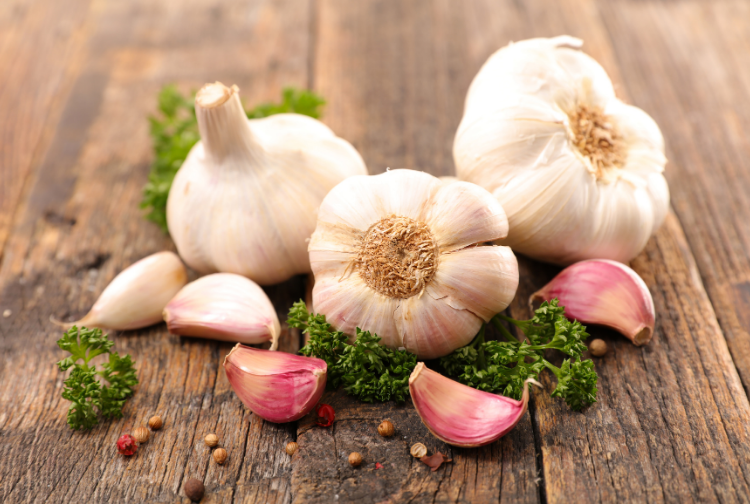Uses and Benefits of Ginger:
- Digestive Health:
- Benefit: Ginger aids digestion by increasing saliva and bile production, which helps to break down food and improve absorption of nutrients.
- Use: It is commonly used to treat nausea, vomiting, and indigestion. It can be especially helpful for pregnant women dealing with morning sickness or chemotherapy patients facing nausea.
- Anti-inflammatory and Pain Relief:
- Benefit: Ginger has potent anti-inflammatory properties that help reduce muscle pain and joint stiffness.
- Use: It is widely used to relieve symptoms of osteoarthritis, rheumatoid arthritis, and other inflammatory conditions. Drinking ginger tea or applying ginger oil can reduce pain and inflammation.
- Boosts Immunity:
- Benefit: Ginger helps boost the immune system, thanks to its antioxidant and antimicrobial properties. It supports the body in fighting infections and helps reduce symptoms of colds and flu.
- Use: Consuming ginger tea or raw ginger can help prevent colds, reduce the severity of flu symptoms, and alleviate sore throats.
- Improves Circulation:
- Benefit: Ginger promotes healthy blood circulation, which can prevent clots and reduce the risk of cardiovascular diseases.
- Use: Ginger can be consumed to improve circulation, regulate blood pressure, and reduce cholesterol levels.
- Relieves Menstrual Pain:
- Benefit: Ginger has been found to be effective in reducing menstrual pain and discomfort.
- Use: Women often take ginger during their menstrual cycle to ease cramps and discomfort.
- Supports Brain Function:
- Benefit: The antioxidants in ginger help protect against age-related cognitive decline and improve brain function.
- Use: Consuming ginger may enhance memory, attention, and overall cognitive abilities.
- Helps Control Blood Sugar:
- Benefit: Ginger may improve insulin sensitivity and lower blood sugar levels, which can be beneficial for people with Type 2 diabetes.
- Use: It can be added to meals or consumed as a supplement to help manage blood sugar levels.
- Weight Loss:
- Benefit: Ginger has thermogenic properties, meaning it can help the body burn fat and increase metabolism.
- Use: Drinking ginger tea or incorporating ginger into meals may assist with weight management.
- Alleviates Respiratory Issues:
- Benefit: Ginger helps clear the airways, reduce coughing, and alleviate asthma symptoms.
- Use: Ginger tea, especially with honey and lemon, is an excellent remedy for respiratory issues like bronchitis or a persistent cough.
- Anti-cancer Properties:
- Benefit: Some studies suggest that ginger may help inhibit the growth of cancer cells due to its antioxidant and anti-inflammatory effects.
- Use: Though more research is needed, ginger may be included in a healthy diet as a preventive measure against cancer.
How to Grow Ginger:
Ginger thrives in warm, humid climates. It is typically grown from rhizomes (roots) rather than seeds. To grow ginger:
- Choose a rhizome with buds (often available at garden stores).
- Plant in well-drained, rich soil in a sunny or partially shaded spot.
- Water regularly to keep the soil moist but not waterlogged.
- Harvest after 8-10 months, when the plant’s leaves begin to turn yellow.
Countries Where Ginger Is Found:
- India (largest producer)
- China
- Indonesia
- Thailand
- Nigeria
- The Philippines
Intake Amount and Timing:
- Amount: For general health benefits, 1-2 grams of ginger per day is often recommended. For nausea or digestion, 1-2 teaspoons of fresh ginger or ginger powder can be consumed.
- Timing: Ginger can be consumed throughout the day, either in tea, meals, or as a supplement. For nausea, it is most effective when taken at the onset of symptoms.
Cures and Therapeutic Uses:
- Nausea Relief: Ginger is widely used to combat nausea, especially for morning sickness during pregnancy or nausea related to motion sickness or chemotherapy.
- Joint Pain: Ginger can be used as an alternative or supplement to pain medications, providing relief for conditions like arthritis.
- Cold and Flu: Ginger helps in reducing symptoms like congestion, sore throat, and cough, speeding up recovery.
- Headaches: Ginger’s anti-inflammatory properties can reduce the severity of headaches and migraines.
Other Useful Information:
- Side Effects: Ginger is generally safe for most people. However, it can cause mild heartburn, stomach upset, or irritation when consumed in excess. It may also interact with blood-thinning medications, so it’s essential to consult with a healthcare provider before taking large amounts of ginger.
- Storage: Fresh ginger should be kept in a cool, dry place and used within a few weeks. It can also be frozen to extend shelf life.
Incorporating ginger into your diet can offer a wide range of health benefits while adding a unique flavor to meals and beverages.



